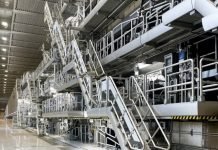The Renewable Materials Conference, a leading meeting point for industry, academia, investors and policy makers for the fossilization of chemicals and materials via substitution of fossil carbon by biomass, CCU and recycling, will take place from 11-13 June 2024 in Siegburg/Cologne (Germany) and online.
Decarbonisation and fossilization
What is the difference? Decarbonization relates to the energy and fuel sector and means replacing carbon-based fuels with electricity and hydrogen. Often, the term is used to refer to fossil CO₂ emissions, meaning that biofuels have also become part of the decarbonisation strategy.
The situation is very different in the chemicals and materials sector. Here, most intermediates and products contain embedded carbon – and are even based on carbon – which can never be replaced by anything else. In fact, this sector requires a constant and even increasing demand for carbon. It is not the chemicals and materials that can be decarbonised, only the associated process energy can. But they can be fossilized if the carbon source is not fossil carbon from the ground, i.e. not crude oil, natural gas or coal.
Fossilisation is the key point of the conference, which will focus on the three alternatives to fossil carbon from the ground: biomass, CO₂ utilization and recycling. The unique concept of showcasing all renewable material solutions at one event hits the nail on the head and covers the entire value chain of the renewable carbon economy.
And there is a lot to do! Today, the global chemicals and plastics industry uses 550 million tonnes of embedded carbon in its products, and this amount will double by 2050. Today, 88% of this carbon comes from fossil sources, mainly oil, 8% from biomass, and only 4% from recycling and 0.04% from CCU. Numerous innovations and investments are required to increase the share of the three renewable carbon sources to almost 100%. What are the visions and strategies of industry and policy to achieve a fossil-free chemicals and materials industry?
The conference
Over three days, top speakers from industry, academia and politics will present and discuss the latest developments in strategy, technology, innovation, policy and market trends to an international audience of experts in 80 presentations, 20 panel discussions and more than ten workshops. The final program is now set and six innovations have been nominated for the award ‘Renewable Material of the Year 2024.’ Companies, associations and institutes are still invited to run a workshop and take part in the exhibition.
“The Renewable Materials Conference (RMC) serves as a vital platform for collaboration and knowledge exchange in the renewable materials sector,” says Michael Carus, CEO nova-Institute, and organizer of the RMC. “Our comprehensive approach covers the entire value chain, from alternative carbon feedstocks, the chemical industry, the materials sector, product manufacturers to brand owners and investors, making the RMC the ultimate platform for networking and partnering in the new renewable carbon economy.”
Furthermore, the conference will cover a wide range of concepts and technologies: sustainable carbon cycles, renewable refineries, and chemical recycling as well as new process technologies, i.e. technologies for the production of renewable chemicals, building blocks, polymers, plastics and fine chemicals based on renewable carbon.











